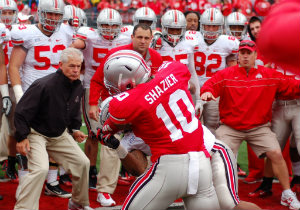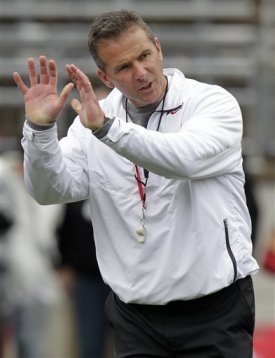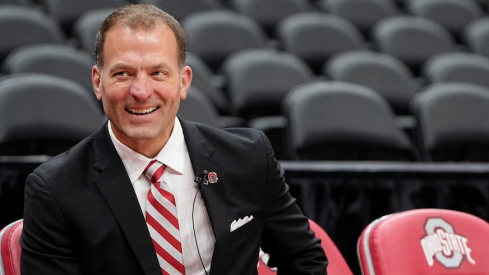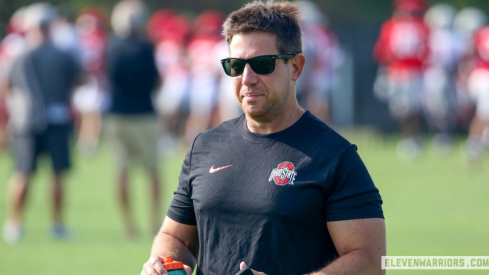 RDS dominating in the circle drill
RDS dominating in the circle drill One of the biggest differences between the Tressel and Meyer regimes has been Meyer's increased intensity and competition - his desire to separate winners and losers in a way that Tressel never did.
Practice observers have noted the changing atmosphere, increased competiton and Urban's intensity, which apparently looks something like "he’s some sort of a cross between an evil-genius and God-like figure in Columbus; the man is so intense he may or may not breathe fire."
This has led to several new programs and traditions, including at least four "winner-loser" days of practice in which winners received gatorade while losers enjoy gassers, his three-tiered caste system and champion's club based upon classroom, weight, diet, and on-field performance, and the circle drill on display before the spring game.
The approach seems to be popular with the players, with Stoneburner, Guiton, Goebel and Hankins voicing their support for the increased competition.
Under Meyer, everything is incentive based:
Everything we try to do around here is incentive-based. You want to live off campus, I have no problem with that. But you have to earn that right. A big thing is wearing visors or changing your number to No. 1. I don't really care what you wear but don't come see me unless you are taking care of your business in all the other areas that we evaluate."
And leaders are supposed to emerge from "corporate, cut-throat" and "Darwinian" competition:
"I really want to see guys lead by not losing. You want to be a great leader? Go win. That's where we're really pushing Braxton. All the players, when you go against someone -- don't lose. There's a million excuses. Our whole focus is, go win. Winners have a tendency to stand in front of the team. Losers don't. So we're really pushing that winner-loser mentality right now."
Urban clearly believes that he is best able to motivate his players through intense competition that results in the public separation of winners and losers. Maybe due to his psychology degree, Urban's new traditions have their roots in one strain of education psychology known as achievement goal theory.
Achievement goal theory differentiates between learning goals and performance goals. While learning goals concern one's personal understanding and appreciation for what is being learned, performance goals involve increasing one's status by outperforming peers. Achievement goal theorists hypothesize that performance goals "trigger superficial, rote-level processing that exerts a stultifying influence on achievement" while learning goals favor deep processing of information and increased scholastic achievement.
Meyer at least informally recognizes this differentiation based upon the incentive structures of programs like the winner-loser days and the circle drill. The goal of these drills is not simply learning technique and football, but to increase players' competitiveness. For Meyer, competitiveness itself is a goal rather than simply a means to other goals.
While many psychologists deride performance goals within classroom settings, they clearly have a place on the instrinsically competitive football field, where everything is a relative competition at the internal level (fighting for first string, offense vs. defense winner-loser days) and external level (winning the game). Goebel demonstrated the need for competiton when he said, "You can only push yourself so far, and then you need someone else there by you with equal talent pushing you. It just makes you both that much better. It's awesome."
 Some people thrive in stressful environments
Some people thrive in stressful environmentsMany studies have demonstrated that "public recognition for doing better than others (reinforcing of performance goals)...supports such prosocial behaviors as submission to teacher authority and a willingness to try hard." These two goals - coach acountability and competition - are the crux of Meyer's approach to coaching.
All of his new traditions are designed to publically recognize winners. It's clear why Meyer opened the spring game with a circle drill in front of all 80,000 fans - besides getting the players hyped for the game, it created easily identifiable winners and losers in front of a large audience. It's easy to miss individual battles being won and lost during scrimmages and games amidst the chaos of a play, but the circle drill focuses everyone's attention in on the outcome of just a single battle.
Furthermore, he is extremely candid about his opinions of his best players - enough to publically reward Boren and Simon (annointing Simon as a captain already) in front of the media. Simon of course responded by saying it only mattered to him if his fellow players also elected him as a captain demonstrating how Simon made captainship a learning goal rather than just a performance goal.
One of the fears with such a focus on competition is that the rewards - first string, being in the champion's club - become more about just avoiding failure. Some education scholars believe that this approach causes students who receive poor grades to feel worthless, without any alternative sources of personal satisfaction.
This is not to say that Urban never employs learning goals, but football itself naturally attracts a specific subgroup of "overstriver" individuals who are competitively and defensively motivated to avoid failure. For these overstrivers, "the direction of the impact of tension on the quality of test preparation is reversed. Instead of impairing their studies, as it does for failure avoiders, the presence of emotional tension actually mobilizes the enormous capacity of overstrivers for study, which typically takes the form of slavish overpreparation."
That is, overstrivers thrive in the intense, competitive and high-stress environments that Meyer cultivates. Meyer recognizes that the individuals he works with are different and he's adjusted his incentive structures accordingly.
All coaches implicitly incorporate these ideas to various degrees, but Meyer is clearly driven by performance goals that foster a competitive environment for overstriver players.

